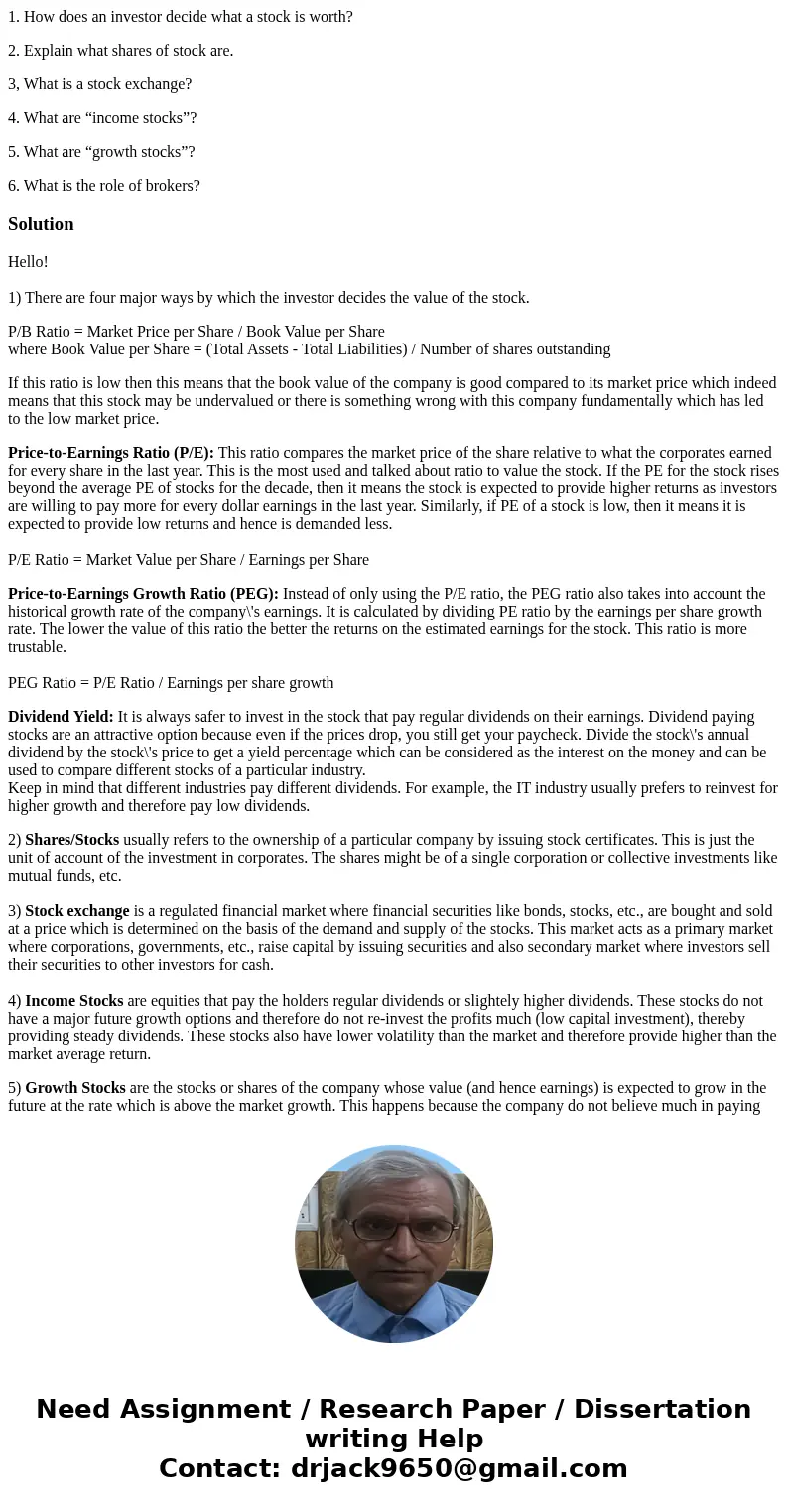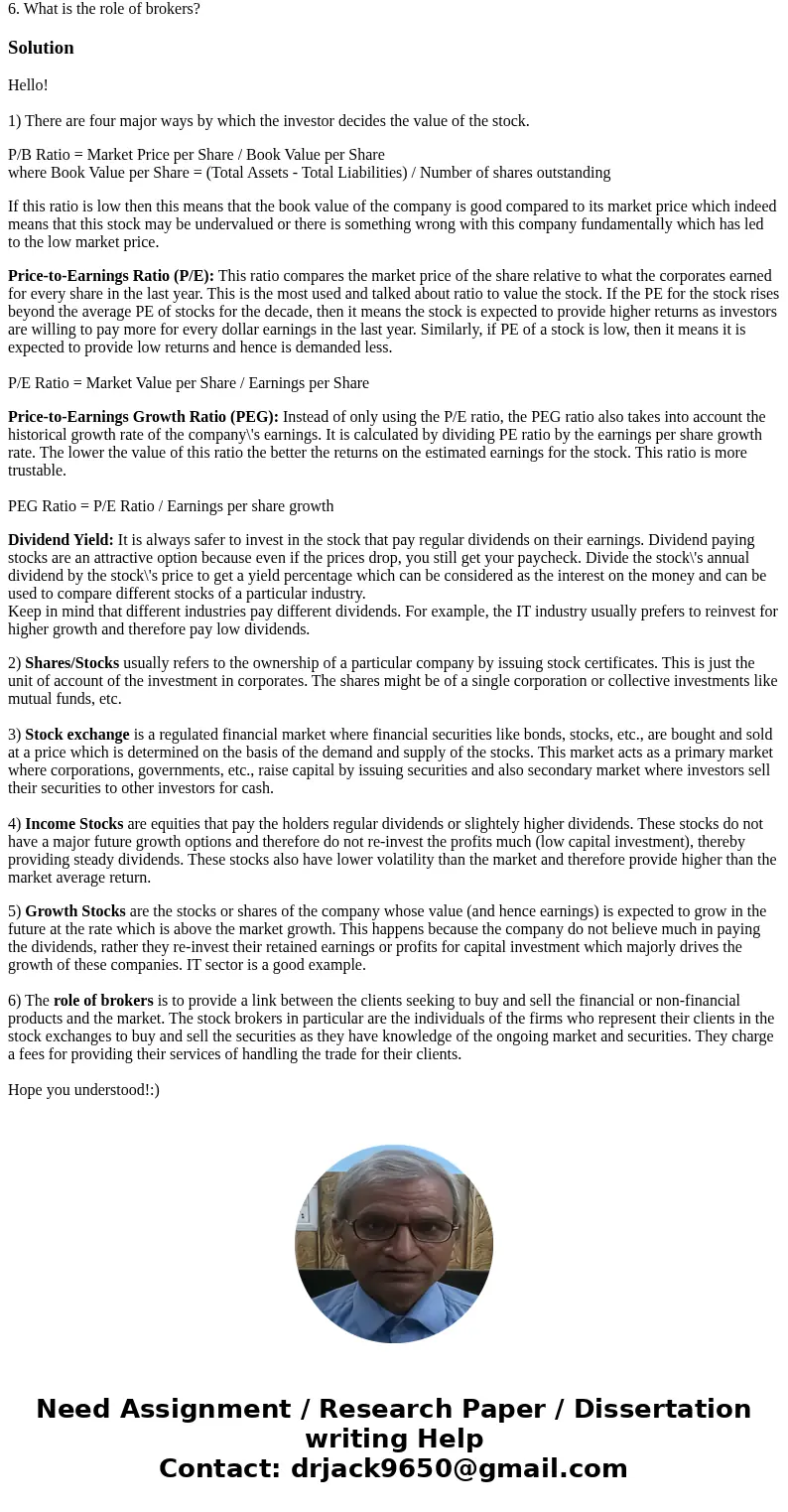1 How does an investor decide what a stock is worth 2 Explai
1. How does an investor decide what a stock is worth?
2. Explain what shares of stock are.
3, What is a stock exchange?
4. What are “income stocks”?
5. What are “growth stocks”?
6. What is the role of brokers?
Solution
Hello!
1) There are four major ways by which the investor decides the value of the stock.
P/B Ratio = Market Price per Share / Book Value per Share
where Book Value per Share = (Total Assets - Total Liabilities) / Number of shares outstanding
If this ratio is low then this means that the book value of the company is good compared to its market price which indeed means that this stock may be undervalued or there is something wrong with this company fundamentally which has led to the low market price.
Price-to-Earnings Ratio (P/E): This ratio compares the market price of the share relative to what the corporates earned for every share in the last year. This is the most used and talked about ratio to value the stock. If the PE for the stock rises beyond the average PE of stocks for the decade, then it means the stock is expected to provide higher returns as investors are willing to pay more for every dollar earnings in the last year. Similarly, if PE of a stock is low, then it means it is expected to provide low returns and hence is demanded less.
P/E Ratio = Market Value per Share / Earnings per Share
Price-to-Earnings Growth Ratio (PEG): Instead of only using the P/E ratio, the PEG ratio also takes into account the historical growth rate of the company\'s earnings. It is calculated by dividing PE ratio by the earnings per share growth rate. The lower the value of this ratio the better the returns on the estimated earnings for the stock. This ratio is more trustable.
PEG Ratio = P/E Ratio / Earnings per share growth
Dividend Yield: It is always safer to invest in the stock that pay regular dividends on their earnings. Dividend paying stocks are an attractive option because even if the prices drop, you still get your paycheck. Divide the stock\'s annual dividend by the stock\'s price to get a yield percentage which can be considered as the interest on the money and can be used to compare different stocks of a particular industry.
Keep in mind that different industries pay different dividends. For example, the IT industry usually prefers to reinvest for higher growth and therefore pay low dividends.
2) Shares/Stocks usually refers to the ownership of a particular company by issuing stock certificates. This is just the unit of account of the investment in corporates. The shares might be of a single corporation or collective investments like mutual funds, etc.
3) Stock exchange is a regulated financial market where financial securities like bonds, stocks, etc., are bought and sold at a price which is determined on the basis of the demand and supply of the stocks. This market acts as a primary market where corporations, governments, etc., raise capital by issuing securities and also secondary market where investors sell their securities to other investors for cash.
4) Income Stocks are equities that pay the holders regular dividends or slightely higher dividends. These stocks do not have a major future growth options and therefore do not re-invest the profits much (low capital investment), thereby providing steady dividends. These stocks also have lower volatility than the market and therefore provide higher than the market average return.
5) Growth Stocks are the stocks or shares of the company whose value (and hence earnings) is expected to grow in the future at the rate which is above the market growth. This happens because the company do not believe much in paying the dividends, rather they re-invest their retained earnings or profits for capital investment which majorly drives the growth of these companies. IT sector is a good example.
6) The role of brokers is to provide a link between the clients seeking to buy and sell the financial or non-financial products and the market. The stock brokers in particular are the individuals of the firms who represent their clients in the stock exchanges to buy and sell the securities as they have knowledge of the ongoing market and securities. They charge a fees for providing their services of handling the trade for their clients.
Hope you understood!:)


 Homework Sourse
Homework Sourse